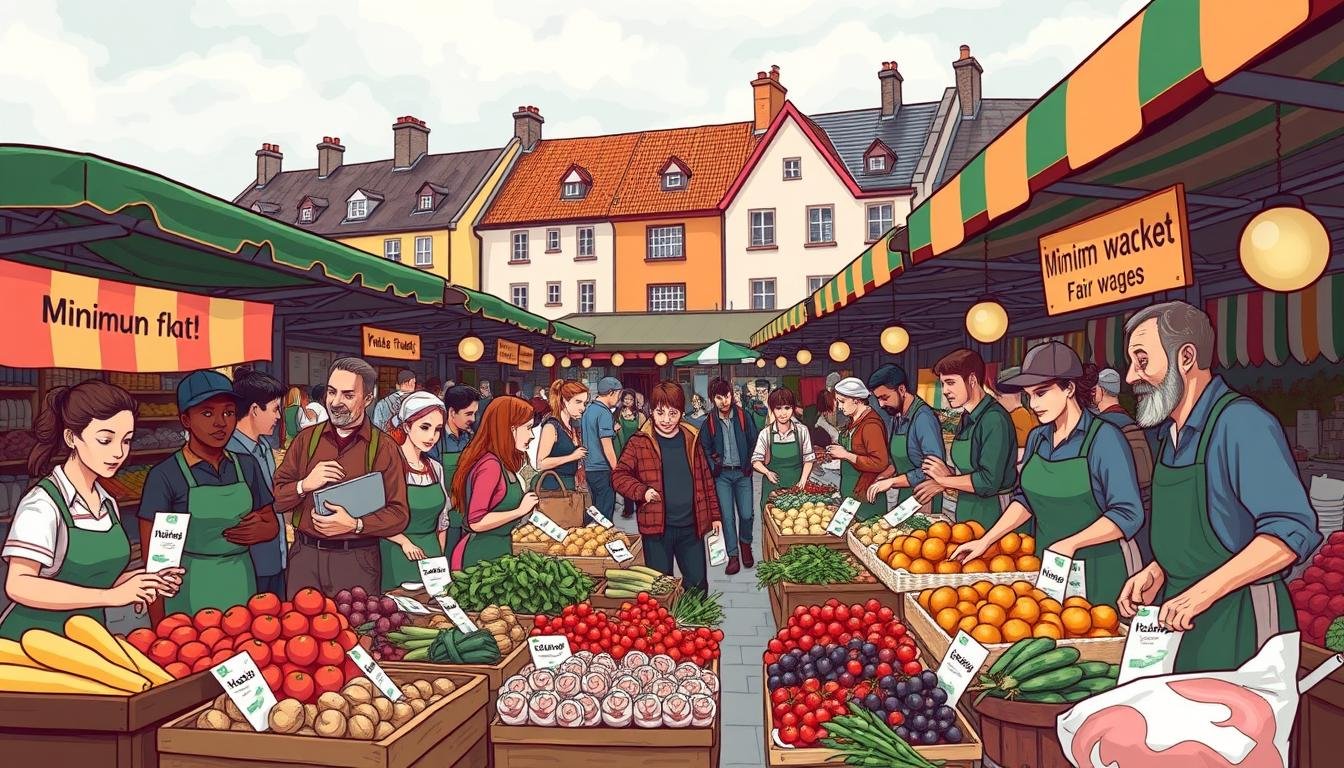Ireland’s Minimum Wage: What You Need to Know
Understanding Ireland’s minimum wage is key for employers and employees. The national minimum wage has seen recent changes. It’s vital to know about these updates and how they might affect work.
But what are these changes, and how do they shape the economy? Let’s explore the answers to this important question.
Key Takeaways
- The national minimum wage in Ireland is now €12.70 per hour for employees aged 20 and over.
- Minimum wage rates vary for younger workers, ranging from 70% to 90% of the standard minimum wage.
- Employers can only be exempt from paying the full rate, not the reduced rate for employees under 18.
- The Labour Court can grant employers permission to pay below the minimum wage due to financial difficulties.
- Victimization or dismissal of an employee for requesting the minimum wage is protected by law.
Introduction to Ireland’s Minimum Wage
Ireland’s minimum wage policies have changed over time. They aim to balance fair pay for workers with economic growth. This ensures everyone gets a fair deal.
As of January 2024, the minimum wage in Ireland is €12.70 per hour. This rule mostly applies to adult workers. However, younger employees and trainees might have different rates. The Low Pay Commission reviews this wage each year.
The first minimum wage law in Ireland was passed in 2000. It has been updated several times since then. The Low Pay Commission, set up in 2015, now helps decide the wage.
- The Low Pay Commission has a chairperson and eight members. They also have representatives from workers, employers, and experts.
- The Commission suggests the minimum hourly wage each year. They look at fairness, economic stability, and job rates.
- They also compare wages with Great Britain and Northern Ireland.
The minimum wage in Ireland has gone up over the years. It started at €5.58 in April 2000 and is now €12.70 as of January 2024. This increase helps workers keep up with the cost of living and economic changes.
Current Minimum Wage Rates
In January 2024, Ireland updated its minimum wage to keep up with the cost of living. The new standard rate is €12.70 per hour. Rates for younger workers and trainees vary, from 70% to 90% of the standard rate.
Standard Minimum Wage
The standard minimum wage in Ireland is now €12.70 per hour. This applies to those 20 and older. It ensures they get a fair wage for their work.
Rates for Younger Workers and Trainees
- Those 19 years old earn €11.43 per hour, 90% of the standard rate.
- At 18, the minimum wage is €10.16 per hour, 80% of the standard rate.
- Workers under 18 get €8.89 per hour, 70% of the standard rate.
These rates help younger workers and trainees ease into the job market. They also ensure fair pay while they learn new skills.
“The adjustments to Ireland’s minimum wage aim to strike a balance between supporting workers and fostering economic stability.”
Key Considerations
In Ireland, the minimum wage is always changing. The cost of living adjustments are key. They make sure the minimum wage stays up with the economy. This helps workers buy what they need.
Ireland also looks out for younger workers and trainees. They have their own wage levels. This helps them grow and learn.
The goal is to keep the economy stable and improve well-being. The minimum wage aims to pay workers fairly. It also helps businesses stay strong. This boosts spending and helps the economy grow.
Cost of Living Adjustments
The cost of living adjustments in Ireland’s minimum wage reflect the economy. They account for inflation and rising costs. This keeps minimum wage earners’ living standards steady.
Youth and Trainee Rates
Ireland has special wages for younger workers and trainees. Those under 18 get 70% of the standard wage. Those 18 to 19 get 80% and 90%, respectively. This helps them learn and grow.
Economic Stability
The economic impact of minimum wage adjustments in Ireland is important. The government wants to pay workers fairly and keep businesses strong. This helps spending and boosts the economy.
Sector-Specific Minimum Wages
In Ireland, the standard minimum wage is a starting point. But, some sectors have their own rates due to special agreements and the nature of the work. These rates reflect the specific needs, skills, and risks of each job type.
Construction Sector
The construction industry has a higher minimum wage. This is because of the physical demands, safety needs, and specialized skills needed. As of January 2024, construction workers in Ireland earn €13.95 per hour, which is about $15.30 USD.
Hospitality and Retail
Jobs in hospitality and retail, like in hotels, restaurants, and shops, have their own wage rules. The minimum wage for these jobs is €12.95 per hour, or about $14.20 USD. This reflects the unique challenges and the need to interact with customers.
Agricultural Workers
Agricultural workers in Ireland, including those in farming, fishing, and related fields, have a special minimum wage. It is set at €12.05 per hour, or around $13.20 USD. This rate considers the physical labor, seasonal work, and unpredictable nature of these jobs.
“The sector-specific minimum wages in Ireland ensure that the unique needs and demands of different industries are properly recognized and compensated.”
Additional Sector-Specific Agreements
The national minimum wage is a starting point for workers in Ireland. But, some sectors have their own rates and rules through agreements. These sector-specific minimum wage agreements ensure fair pay for workers in cleaning, security, transport, logistics, and healthcare.
The Contract Cleaning Sector and Security Sector have Employment Regulation Orders (EROs). These orders set the minimum pay and work terms. The Early Learning and Childcare Sector also has an ERO. These agreements meet the needs of employers and employees in these areas.
The Mechanical Engineering Building Services Contracting Sector and Construction Sector have Sectoral Employment Orders (SEOs). These orders set the minimum pay for workers. The Construction Sector SEO, updated in 2023, ensures fair pay for workers.
These agreements also have ways to solve disputes. They aim to create economic stability and fair working conditions in Ireland’s different industries.
“Sector-specific minimum wage agreements in Ireland help address the unique needs and challenges faced by employers and employees in various industries, promoting fair compensation and economic stability.”
The Importance of Sector-Specific Minimum Wages
In Ireland, sector-specific minimum wages are key to fair pay across various industries. They adjust wages based on job needs, ensuring equity and fairness. This approach helps attract and keep talent, boosts job satisfaction and productivity, and keeps workplaces safe.
The National Minimum Wage in Ireland started in 2000 to tackle low pay and income gaps. Before, Ireland had a big gap in pay between the lowest and highest earners. The National Minimum Wage Act was passed thanks to efforts to highlight low pay and better coordination of wages.
Minimum wages for specific sectors account for each industry’s unique situation. This helps employers attract and retain top talent, leading to job satisfaction and higher productivity. It also ensures health and safety in the workplace, considering the specific risks of each job.
“Sector-specific minimum wages are essential for promoting equity and fairness in the labor market. They recognize the unique challenges and requirements of different jobs, helping to attract and retain talent, improve job satisfaction, and ensure health and safety in the workplace.”
As Ireland’s labor market evolves, sector-specific minimum wages remain vital. They help create a more balanced and equitable economic landscape, benefiting both employers and employees.
Recent Changes and Their Impacts
Ireland’s minimum wage has gone up to €12.70 per hour. This shows the government’s effort to keep wages in line with living costs. It aims to better the lives of low-income workers and cut income gaps.
Why the Increase?
The minimum wage hike was needed due to Ireland’s rising living costs. Energy prices have jumped by 23% and food costs by 21% in the last year. Also, rent has gone up by 7%, making life harder for those on lower incomes.
Economic Impact
The new minimum wage brings benefits like better living standards and more spending. But, it also poses challenges for businesses. They might cut jobs or hire less to stay profitable. The government plans to raise the Living Wage to €14.80 by 2024, hinting at more wage hikes to ensure a fair living for everyone.
“The minimum wage increase is a crucial step in addressing income inequality and ensuring that all workers in Ireland can afford a decent standard of living. However, it’s important to monitor the economic impact and make necessary adjustments to strike a balance between supporting workers and maintaining a thriving business environment.”
Comparison with Other Countries
Ireland’s minimum wage is among the highest in the European Union. This shows the country’s high cost of living. The minimum wage in the UK is £10.42 per hour, Germany’s minimum wage is €12 per hour, and France’s minimum wage stands at approximately €11.52 per hour.
Luxembourg has the highest minimum wage globally. Workers over 18 earn a monthly minimum of €3,085, which is about US$3,357. Australia also has a strong minimum wage. People over 21 can earn a minimum of AU$23.23, which is about US$15.23 hourly.
In the United States, the federal minimum wage is $7.25 per hour. Many states and cities have higher rates. Mexico’s minimum wage is MXN 207.43 per day, about US$10.37. Brazil’s minimum wage is R$1,322 per month, which is about US$256.
Workers aged 20 and above in Ireland get a minimum of €12.70 per hour. This is about US$14.15. Ireland is among the top four countries for minimum wage globally.
“The minimum wage in Ireland is a crucial factor in ensuring a fair and livable wage for workers, and its comparison to other countries highlights the broader global trends in labor policies.”
Minimum wage in Ireland
Ireland’s minimum wage policies have seen big changes lately. These changes aim to balance economic growth with social welfare. This guide has covered the 2024 minimum wage rates, recent updates, and their economic impact.
The national minimum wage in Ireland now is €12.70 per hour, starting January 1, 2024. This is an 80-cent increase from before, a 6.3% rise. It’s meant to help the lowest-paid workers and tackle cost-of-living issues.
These wage changes consider inflation, pay rises in the private sector, and how they affect small and medium enterprises (SMEs). Talks are also happening about moving to a living wage by 2026. This means the minimum wage will keep changing.
Some sectors, like construction, hospitality, and agriculture, might have their own minimum wages. These are set through agreements or orders from joint labor committees. This gives extra protection to workers in these fields.
“The proposed increase recommended by the Low Pay Commission is 80 cents per hour, bringing the pay increase to 6.3% for the lowest-paid workers.”
As Ireland moves towards a living wage system, the minimum wage will be key. Employers and employees need to keep up with these changes. This helps them navigate the shifting landscape well.
In conclusion, the 2024 minimum wage updates in Ireland show the ongoing efforts to help low-wage workers. They also balance business interests. By understanding these changes, everyone can make better decisions. This helps Ireland’s economy and society grow.
Broader Social Implications
Ireland’s minimum wage policy has big social effects, going beyond just money. It makes sure workers get fair pay. This helps build a more united and welcoming society.
Social Cohesion
Increasing the minimum wage can lessen economic gaps and social problems in Ireland. When workers earn enough, it closes the gap between rich and poor. This brings financial stability and chances for those with less money.
This leads to a stronger sense of community and shared success. It makes society more cohesive.
Health and Education
The minimum wage’s effects go beyond just money. Higher wages mean workers can afford better health care and education. This improves health and education levels.
It benefits workers and helps make the workforce more skilled and productive. This drives Ireland’s economic growth in the long run.
“Ensuring fair compensation can reduce economic disparities and social tensions, promoting a more inclusive society.”
By focusing on the minimum wage’s social impacts, Ireland’s leaders aim for a fairer and wealthier society. They want everyone to have the chance to succeed.
Conclusion
Ireland’s minimum wage has gone up to €12.70 per hour in 2024. This change is a big step towards fair wages and economic balance. It’s important for businesses to understand how to adjust to these changes.
This article has covered the current minimum wage rates, key points, and sector-specific agreements. It also talked about recent changes and their social impact. This information helps both employers and employees deal with the changing economic scene.
The rise in the minimum wage shows Ireland’s dedication to social cohesion and worker well-being. Businesses can prepare for the challenges and chances these changes bring. Employees can fight for their rights and aim for a better life.
As Ireland updates its minimum wage policies, it’s key for everyone to stay informed and involved. Keeping up with the latest news and joining the conversation helps us all. Together, we can build a fairer and more prosperous future for Ireland’s economy and people.
Source Links
- Minimum wage
- National Minimum Wage
- Guide to Minimum Wage for Employers in Ireland
- Ireland’s Minimum Wage: Comprehensive Guide to Rates and Impacts
- Ireland: Minimum wage country profile
- Minimum Wage Policy in Ireland
- National Minimum Wage Ireland
- What is the Minimum Wage for Ireland in 2023?
- National Minimum Wage 2024 | Ireland – Paycheck Plus
- Minimum Wage & Payment Requirements in Ireland | Rivermate
- Complete Guide To The National Minimum Wage in Ireland, 2024
- Minimum Wage – Irish Legal Guide
- What Country Has The Highest Minimum Wage?
- Employment agreements and orders
- How are minimum wages set?
- Minimum wage policy in Ireland
- Cost of living pressures push the Living Wage to €14.80 per hour | Social Justice Ireland
- How will Budget 2025 affect Irish business owners?
- Comparing Minimum Wage by Country: A Global Overview
- List of countries by minimum wage
- Rise in national minimum wage from €12.70 to €13.50 an hour to be considered by Cabinet
- Ireland
- CSO releases minimum wage data | Social Justice Ireland
- The Impact of a Minimum Wage Change on the Distribution of Wages and Household Income
- A pathway towards a ‘living wage’ as a Minimum Wage is required | Social Justice Ireland








